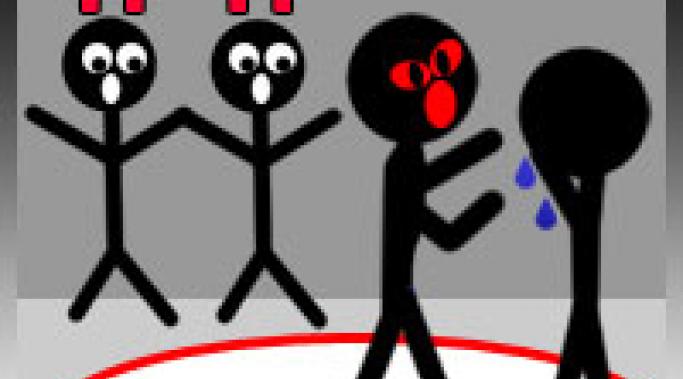The last post offered insight into how to help your friend's wife who says she's being abused. This is the second email from a man who finds himself in that exact situation:
"The first time she and I talked, she asked that I not tell anyone and then said, "Do you think I am stupid?" That broke my heart. I replied, "You are a brilliant, kind person," and that put a smile on her face. I set out to help her build self-esteem.
"I email her every day with verbal abuse information. She doesn't send much of a reply back, so it is hard to know if she will take some type of action. Should I not email her anymore and hope that she gets help? Should I keep giving her advice and just hope that she does something about the abuse? To what degree do I detach myself?"
Stop Abuse
Recently I received an email from a man who asked a very good question. He said,
"A friend's wife opened up to me about what I think is verbal abuse. She is talking about leaving him if things don't change, but she's afraid her kids will hate her for leaving their father and their million dollar home. His wife has such a big heart. She's really a wonderful person. I want her to be happy. I am very surprised to know that my friend, such a nice guy when he's with me, abuses his wife this way. What can I do to guide his wife down the right path?"
Verbal abuse books helped me discover that my marriage problems were rooted in verbal and emotional abuse. I felt relief because up until I read the library of verbal abuse books available, I thought that I was losing my mind. My abusive husband had almost convinced me that every problem in our marriage was my fault. He said I was inept and out of touch with reality.
The verbal abuse books taught me that my husband was wrong. But more importantly, the verbal abuse books taught me the vocabulary of abuse so I could finally describe what was happening to me.
The last post talked about why losing control of your emotions helps your abusive partner gain control of you. Trust me, I know how challenging it is to keep your composure when the verbal abuser is pushing your buttons! I've lost control of myself more times than I want to count. I've suffered shame after evaluating my reactions to abuse.
Our goal as targets of verbal abuse is to keep our emotions under our control which leads to a clear mind and conscience. There are ways to bring yourself down to earth and respect your emotions without losing respect for yourself. Living with abuse emotionally challenges you, but it doesn’t have to overcome you.
Your response to verbal abuse can, technically, make you abusive -- at least in that moment. And I'm willing to bet that most anyone who has been on the receiving end of long-term verbal abuse tries to fight fire with fire at some point. It's almost impossible to not retaliate against verbal abuse with more abuse initially, in the time before you understand that you're in an abusive relationship and before you learn better ways to respond to verbal abuse. In my case, my abusive response to verbal abuse turned me into someone I didn't like at all.
Staring at this blank space, waiting for me to write something, reminds me of my days of abuse. Each day could seem so clean and full of promise - the trick was, I had to expend energy to make it a great day, use my will to write the day full of actions that led me toward my goals and toward a new and better day.
But, unfortunately, I didn't have the energy to create a new day. I didn't have the ability to break the day's chains and move forward. All I could do was sit there and wait for the day to write itself. Slowly, just as the sun moved across the sky, my blank day moved from bright to dark with no help from me.
I'd go to bed that night knowing I'd created nothing grand, never mind improved myself in any way. Never mind improving my thoughts, my plans, or the ability to live any dream. No, my days in abuse were blanks. Unwritten opportunities that could have been something grand if only I'd had the energy needed to progress.
Victims of abuse sometimes say and do things to cause abuse. The abuse isn't our fault -- abuse is always the abuser's fault. But since that's the world we victims live in, sometimes we say and do things to cause the abuse, to purposefully cause our abuser to abuse. And yes, victims of abuse often feel they have this sort of control over the abuser. We come by that feeling honestly. After all, we've spent much time studying our abuser's every move and manner of speech, and we can practically predict when abuse will happen. Victims say and do things to cause abuse because we're going to be abused sooner or later, but timing the honeymoon period to specific events just makes life easier.
Boy oh boy I sometimes tire of thinking about domestic abuse!
When I was abused but didn't know it, abuse came out subconsciously through my artwork.
When I was abused and did know it, abuse came out in my writing.
Now that I'm no longer abused (or hardly ever since my ex and I rarely speak), abuse comes out through specific AHA! memories from the past.
Granted, now that I'm away from the verbal and emotional abuse barrage of yesterday, the thoughts are not as detrimental to my Self as they once were. At least now, when I have an AHA! moment, it reflects more "what he did" than "how bad of a person I must be". I am grateful for that.
Way too many abuse victims continue suffering because they do not put together a viable safety plan. Safety planning can be a very taxing, emotional issue for victims because, in essence, they are confronting the fact that even if they love the abuser, they are in danger emotionally and physically. No one wants to believe that, but safety planning forces you to see the danger.
Are you abused because you are you a good wife/husband? A good child? A good employee? What else are you besides "good"? If you don't know, then you could be stuck in your abusive relationship for a very long time.
Good wives and husbands go about fulfilling their roles as they believe a "good" person should. But guess what? If you describe yourself as good, then you must keep a counter-balance in sight - you must keep someone around you who provides the bad because good cannot exist without something bad with which to compare itself.
This is problematic for both groups of abuse victims: the ones currently entrenched in the abusive relationship and the ones who escaped it. Being good keeps you glued to current bad behavior and causes you to unconsciously seek it after your escape.
Why do they stay? Because they're good people. Why did he marry that type of woman? Because he's a good person.









